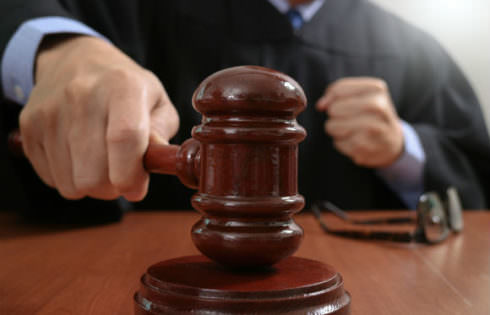
Law prof says it looks like university is ‘taking advantage’ of COVID distraction
Most Cornell University students are banned from campus during the coronavirus pandemic, but that isn’t stopping the administration from considering changes to their rights in disciplinary proceedings.
The University Assembly will consider lowering the standard of evidence needed against students who are accused of nonsexual code violations, following recommendations from its Codes and Judicial Committee on April 18. (Sexual misconduct claims are handled under a different code, known as Policy 6.4.)
The committee declined to recommend, however, that students lose their right to counsel from the Cornell Law School. That had also been proposed by the Office of the Judicial Administrator earlier this month, according to The Cornell Daily Sun.
Barbara Krause, interim judicial administrator, had argued for the elimination of counsel at the April 10 committee meeting, saying the “overall objective” of the proposals is to make the disciplinary process “less legalistic, less like a judicial proceeding,” the newspaper reported.
The committee vote followed a petition, signed by more than 300 students, objecting to the proposals to “force students to vocally represent themselves” and “deprive students the right to cross-examine the [Judicial Administrator’s] witnesses in hearings.”
The proposed amendments to the code are open to public comment through Friday. The code revision process goes back to January 2019 but it was kickstarted at the committee’s April 10 meeting, when the offices of Judicial Administrator and Judicial Codes Counselor gave their comments, the Sun reported.
A Cornell law professor told The College Fix that it looks like the university is “taking advantage of a crisis,” making itself look bad in the public eye. “Why can’t this wait until the fall?”
If the reporting and petition are accurate, “it’s pretty crazy that they are pushing such substantial restrictions on due process through while the campus is effectively shut down, most students have departed, and everyone is focused on dealing with the [coronavirus] pandemic,” wrote William Jacobson (below), founder of the blog Legal Insurrection, in an email.
MORE: Law profs denounce Cornell for withholding Ph.D. on bogus Title IX claim

Samantha Harris, vice president for procedural advocacy at the Foundation for Individual Rights in Education, told The Fix it was “excellent news” that the provision to make students represent themselves was struck down. The recommendation now states that students “will be afforded the assistance of an advisor” of their choosing or provided by the school.
What sticks out to her, however, is that Policy 6.4 already makes students in sexual misconduct cases represent themselves. Harris said she “wishes” that the students who started the petition would “speak up for the due process rights of students in the sexual misconduct setting as well.”
The Office of Assemblies, which coordinates shared governance at Cornell, did not respond to emails and calls from The Fix asking why Cornell is considering code changes now rather than waiting until the fall, when students presumably will be back on campus.
While the proposed revisions are public, the University Assembly briefly considered a resolution to ban the publication of code drafts before their approval by the committee. It was introduced in October and tabled immediately.
Accused students’ rights subject to the whims of hearing chair
At the April 18 meeting, the committee voted down 6-1 the proposal to strip students of their right to counsel from the law school, instead recommending that “advisors” be allowed “to speak on behalf of the student parties.” (The one vote in favor of stripping counsel said the change would be “educational,” echoing the language of Krause, the judicial administrator.)
Law students currently act as advisors to accused students through the Office of the Judicial Codes Counselor. They can actively participate in proceedings, giving opening and closing statements in hearings, questioning the prosecution’s witnesses and preparing documents, JCC head Gabrielle Kanter told the Sun.
But the committee approved an amendment 6-4 that lowered the standard of evidence from “clear and convincing,” which is roughly 75 percent confidence, to “preponderance,” meaning a student is “more likely than not” guilty.
The committee’s explanation notes that Policy 6.4, which governs sexual misconduct, and Greek judicial proceedings use the preponderance standard. The six members who voted for preponderance argued that this standard “helped students engage in the student conduct process in a more ‘educational’ way.” Again, that’s the same rationale used by Krause in favor of removing counsel for accused students.
MORE: Male Cornell student attempted suicide after double-jeopardy suspension
The petition against the proposed changes, released prior to the committee vote, said the deprivation of counsel raises “serious mental health concerns on campus.” The accused students may only be 18 or 19 years old and already trying to juggle studies while defending themselves:
By being forced to vocally represent themselves in hearings, students will be in the uncomfortable position of cross-examining authority figures, including members of law enforcement and their [resident advisors]. Students may also be nervous to give their own opening and closing statements in front of the [Office of the Judicial Administrator] and the hearing panel members. This anxiety may have a chilling effect, and will pressure students who are otherwise innocent to plead responsible before the hearing.
The petition also said students from “privileged backgrounds,” who have experience in “public speaking and debate programs,” will fare better as their own counsel than students from less privileged backgrounds. The proposal would also benefit white males over women and students of color, because the former are stereotyped as “ideal speakers” in American society.
As for cross-examination of witnesses, the petition misunderstands what the Office of the Judicial Administrator actually proposed, according to Kanter (below, second from left), the head of JCC.
MORE: Cornell charges student for revealing it may start admitting more rich students
The petition says it opposes a ban on cross-examination of Judicial Administrator witnesses in hearings, noting that witnesses are typically not alleged victims. A ban would deny students and advisors the right to ask “clarifying,” “relevant” and “follow-up” questions, while giving the hearing panel “only one side of the story.”
Kanter told the Sun that Krause’s office didn’t draft any new language on witnesses; the OJA was simply making comments on the committee’s “working document.” It was Kanter and a faculty representative, law professor Risa Lieberwitz, who drafted the provisions on witnesses, Kanter said.
The proposed code for the “Witnesses and Evidence” section does not lay out a predictable process, however.
While accused students are allowed to question witnesses and present information “pertaining to the case,” and their advisors “must have a reasonable opportunity to participate fully in the hearings,” the proposal gives the hearing chair the authority to pick and choose which rights accused students have.
The chair can ban cross-examination when it comes to “interpersonal conduct” cases such as alleged harassment, when the chair “believes that direct questioning of a witness would result in undue intimidation.” The accused “may” submit questions for the chair to ask, but the proposal doesn’t say the chair has to ask any of them or even lay out criteria for judging which questions are relevant.
‘Unconscionably low burden of proof,’ student panelists seeking favors
In the comment section of the proposed amendments, members of the public praised and criticized the proposals.
Law professor Kevin Clermont, who called himself “the long-time advisor to the JCCs,” praised the section designating law students as JCCs and making the office independent. “Any disciplinary code, no matter how ‘educational’ it is meant to be, will present an endless flow of legal questions,” he wrote.
Self-identified fraternity advisor Richard Kauffeld said the proposal “seeks to remove fairness protections in the current Code and violates students’ rights to due process.” Students can be severely punished if a bare majority of the hearing panel decides “the offense was probable,” he wrote.
Kauffeld also noted that students constitute three-fifths of hearing panels:
The procedures put an incredible amount of power in the hands of students who are seeking approval and recommendations from the university, with an unconscionably low burden of proof for the damage that they can inflict on other students’ lives.
An elderly alum, Homer Fogle, wrote that he had watched Cornell “become increasingly authoritarian, repressive and intrusive.” The proposed code revisions would give administrators “another hammer to use on those students and student organizations that do not buy into the uncompromising demands of ‘diversity, inclusiveness and safety.’”
MORE: Cornell Law investigates men for privately ‘ranking women’
IMAGES: Maksim Kabakou / Shutterstock.com, WilliamAJacobson.com
Like The College Fix on Facebook / Follow us on Twitter






Please join the conversation about our stories on Facebook, Twitter, Instagram, Reddit, MeWe, Rumble, Gab, Minds and Gettr.